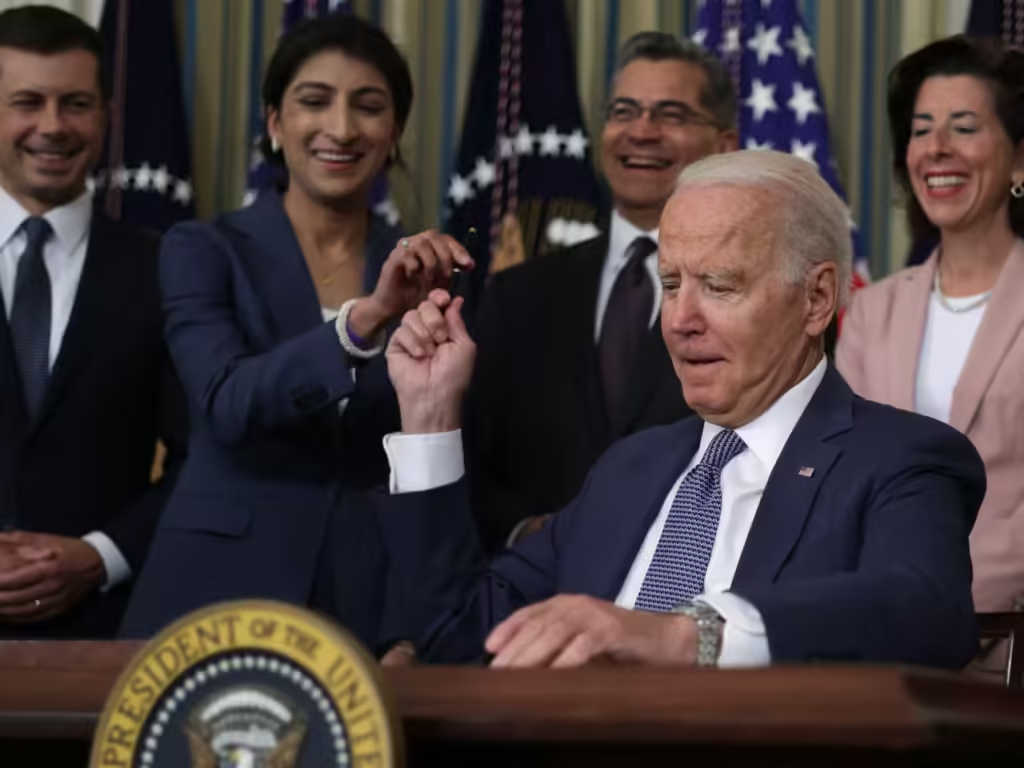Under Biden, antitrust tools were used to crack down on big tech companies. Will the presidential candidates running for the November elections continue this policy? My conclusion, after reviewing the available evidence: No, the 4-year parenthesis is over. The new president will need these companies to compete internationally.
The so-called big tech companies – US corporations, most of which also own at least one digital platform – continue to shape everyday life. Decades after they first emerged, these profitable companies have yet to find competitors capable of cutting into their market share, let alone challenging them for the throne. The Biden administration believes this is because they have committed the crime called “monopolisation” under US competition law, which means to unfairly capture and dominate a market by preventing competition. Let’s first go over the current state of competition policy regarding big tech companies. Then, let’s try to predict the likely course of action of the candidates.
Biden changed a 40-year trend
President Biden appointed hawkish figures such as Lina Khan and Jonathan Kanter as top officials at the Federal Trade Commission and the Department of Justice, respectively, the agencies charged with enforcing competition policy. They bucked a trend that began with President Ronald Reagan in the 1980s by opposing the growth of big tech companies through acquisitions and anti-competitive behaviour that stifled competitors and overcharged customers.

On August 5, Google was found guilty of monopolising the text search market in one of the cases brought against it by the US Department of Justice. The judge will issue another ruling on how to ensure competition in the market, which is expected to be published in the coming months, and then we will see the real uproar. Competitive remedies that the court may impose could range from dividing and selling off some of the company’s business units to ordering it to refrain from certain behaviour. It could be a combination of all of these, or the judge could come up with a complex set of orders. Google also has an ongoing case in the US for monopolising the digital advertising market. Lawsuits against Apple, Meta and Amazon are pending.
They won’t split Microsoft!

How will the state end Google’s monopoly in the text search market, of which it is said to own 95%, and open it up to competition? The last time a similar question was asked was in 1998 for Microsoft’s Internet Explorer browser. The outcome of the Microsoft case also sheds light on Google’s fate. The judge in that case, Thomas Jackson, ruled that Microsoft had a monopoly in the operating system market with its Windows product, and that by giving its Internet browser to users free of charge with Windows, Microsoft was attempting to take over the emerging Internet. For this reason, the court ruled that Windows and Internet Explorer should not be owned by the same company and that Internet Explorer should be split and sold.
However, we know that this solution, as envisioned by the court, did not materialise. First, the decision was appealed to the Supreme Court on the grounds that Judge Jackson had given a statement to the press before it was published. In 2001, the Clinton administration, which brought the case, was replaced by the Bush administration, and Microsoft reached a compromise that did not include a spin-off plan and did not require the company to change any of its policies.
The company did not split, but it did not make its mark on the Internet. In 1998, the Google search engine was launched. In 2007, the iPhone came into our lives. These two disruptive innovations, despite Microsoft’s efforts to develop its own mobile operating system or continually innovate its browser, had the final say on how individuals used the internet, and we saw Apple and Google, not Microsoft, dominate. Needless to say, with the development of social media and video streaming, other companies have joined the ranks.
Will the crackdown on big tech companies continue?
As in the rest of the world, it is more important what the politicians say than the courts. A new administration will take office in the US next January. This administration, no matter which of the candidates wins, seems to follow a different competition policy than the Biden administration. Let’s try to predict how Kamala Harris, the Democratic Party’s candidate for the US presidency, and Donald Trump, the Republican Party’s candidate, will approach big tech companies.
Harris has not announced what her policies would be if she wins. It is impossible to predict what Trump will do. I think that both candidates will put the support of digital platforms on hegemonic issues such as the control of content on social media and critical technologies (e.g. artificial intelligence) ahead of the fight against the monopolisation of these companies. These two issues are vital for the US to maintain its hegemony, which is being challenged by China, and to “build consent” in the Western world regarding its role in the apocalyptic events in the Middle East and Eastern Europe. The power brokers, especially those centred around the Democratic Party, want to postpone a change of flag with China as long as they can. In a life and death situation like this, who wants to break up and weaken the monopolised platforms they have?
Harris is the winning candidate

The announcement of Kamala Harris’s candidacy to replace Joe Biden, whose chances of winning after the assassination attempt on Trump have been all but eliminated, has caused great excitement – at least in half the country. Although she currently serves as Biden’s deputy, Harris’ stance on digital giants is likely to be different from that of the current administration. Before serving as Vice President, Harris served as California attorney general and California senator, respectively. Silicon Valley, which is synonymous with tech companies, is located in the state, and during her tenure there, Harris built close relationships with major tech investors such as Sheryl Sandberg, Melinda Gates, Laurene Jobs, each with billion-dollar portfolios. These relationships have already translated into millions of dollars in donations to Harris’s campaign since her name was announced as a presidential candidate. Some of the tech company investors, executives and venture capitalists who have backed her with both signatures and donations have publicly stated that they want Harris to oust hawkish figures like Lina Khan.
Despite these connections, there are commentators who say there is no sign that Harris will change incumbent bureaucrats or the course of litigation in favour of corporations. In a 2020 interview with CNN as the Democratic Party’s vice-presidential nominee, when asked “Should Facebook be broken up?”, she said that Facebook provides a service that cannot be done without, like electricity or water, yet it is not regulated, so “yes, we should take a serious look at that”.
Nevertheless, I think that Harris will not continue Biden’s hard line and will at least comply with the above-mentioned demands and dismiss the iconic names, because if they continue with these names, they will do their best to open the markets in which the companies they are suing operate to competition. This will inevitably lead to quite radical solutions, including the spin-off of these companies.
My expectation is that the current Democratic Party elites, who are more focused on developments outside the US than inside, will not go so far as to make things “really” difficult for the big tech companies. The last two US administrations, regardless of party affiliation, have not tolerated a positive relationship with the People’s Republic of China as a place of production, a source of skilled workers, or even simply as a market for sales. I would like to predict that the main line of a possible Harris administration will be to force tech companies to compete with China in an absolute way, so as not to make it unnecessarily difficult for those who consent to do so to do business in the US.
Trump the Yellow Swan

While it may seem that big tech companies are in for a tough time if Donald Trump is elected, I think the situation is clear. Let’s start with the facts that these companies should fear. First of all, I should mention that the lawsuits against Meta, Amazon and Apple, including the one against Google, were filed in the last days of Trump’s term. More importantly, Trump also had a direct statement about the Google case: “It’s almost like the Wild West. They need to pay the price.”
Third, Elon Musk is one of Trump’s most important campaign brokers, and he has asked for a role in the “Commission on Government Efficiency”, an idea he has floated if they win, and Trump has indicated that he is open to it. It does not seem possible for Musk to be appointed to an administrative position without divesting his Tesla, SpaceX and X shares. I don’t know what authority Musk would be given in a possible Trump administration, but I think he would want to settle scores with (other) Silicon Valley companies with whom he has long been at odds on issues ranging from his position in the culture war to how artificial intelligence should be developed.
Fourth, Senator J.D. Vance, Trump’s vice-presidential nominee, has endorsed Federal Trade Commission Chair Lina Khan. Vance says he and Khan agree that competition policy has a broader purpose than supporting consumers by keeping prices low. This consensus is an odd side effect of the culture war the US is in. Vance and several other Republican Party senators agree that competition policy should be used to combat digital platforms that they argue are silencing conservatives.
I think that these and similar facts still do not give enough clues about what kind of competition policy Trump will pursue against the digital giants, because we know that executives who run the state like a company, who aim to get rid of the bureaucracy that ties their hands, do not hesitate to make unpredictable moves (some black swans), to call what they call white today black tomorrow and white again next week. That is why Trump’s statements do not carry any value. If Trump is elected, we may very well wake up one morning and read that compromises have been reached with companies that should have been convicted in a way that we will never know the details of.
Conclusion & Expectations

When it comes to big tech companies, there is no such thing as a unified structure with aligned interests, and exceptional but game-changing personalities like Elon Musk have been around from the beginning. As the digital giants compete to dominate services related to artificial intelligence, a new area for continued growth, their internal contradictions will increase. We have never seen them sharpen a knife that could cut their own flesh, such as when the CEO of Microsoft testified against them in the Google trial. So we can’t say that the big tech companies are destined for public intervention.
A change of management does not affect how the lawsuits against the tech giants will play out; they will be settled in the courts of first instance within a year or two. But, as in the Microsoft case above, it does affect whether management will stand by its case on appeal, or how court decisions will be enforced.
Harris has not indicated what her policy would be if she wins. It is impossible to predict what Trump will do. I think that both candidates will put the support of digital platforms ahead of the fight against the monopolization of these companies on hegemonic issues such as the control of content on social media and critical technologies (e.g. artificial intelligence). These two issues are vital for the US to maintain its hegemony, which is being challenged by China, and to “build consent” in the Western world regarding its role in the apocalyptic events in the Middle East and Eastern Europe. The power brokers, especially those centered around the Democratic Party, want to postpone a change of flag with China as long as they can. In such a matter of life and death, who would want to break up and weaken the monopolized platforms at their disposal?
Moreover, we are talking about a period in which the executives of these companies provide monetary and verbal support to the campaigns of presidential candidates, their lobbyists spend hundreds of millions of dollars to influence Congress, and Supreme Court justices enter into bizarre relationships with them. I think that any company that does not make the mistake of getting involved in day-to-day politics and directly confronting the administration will somehow find its way through the lamplit corridors of the capital, no matter who is elected president. To expect otherwise would be to miss the fundamental raison d’être of competition policy, which is to ensure that capitalism moves forward without causing too much disruption.




